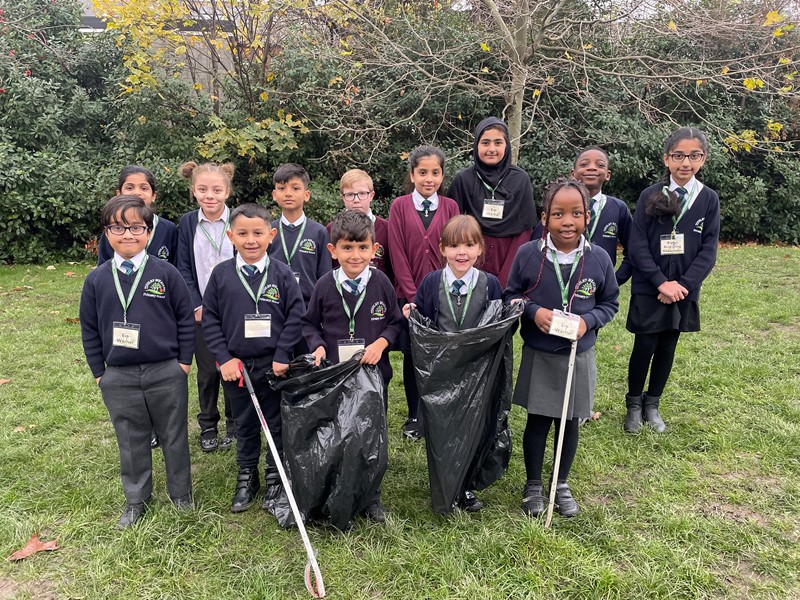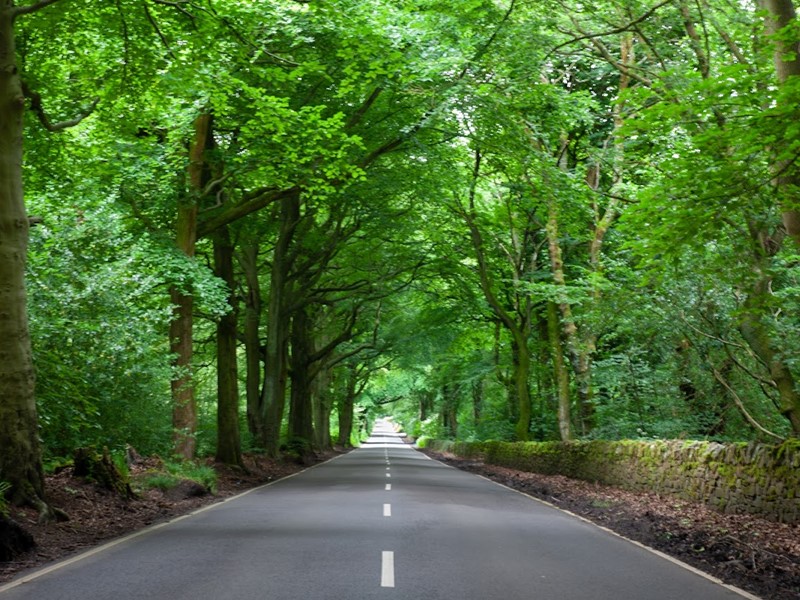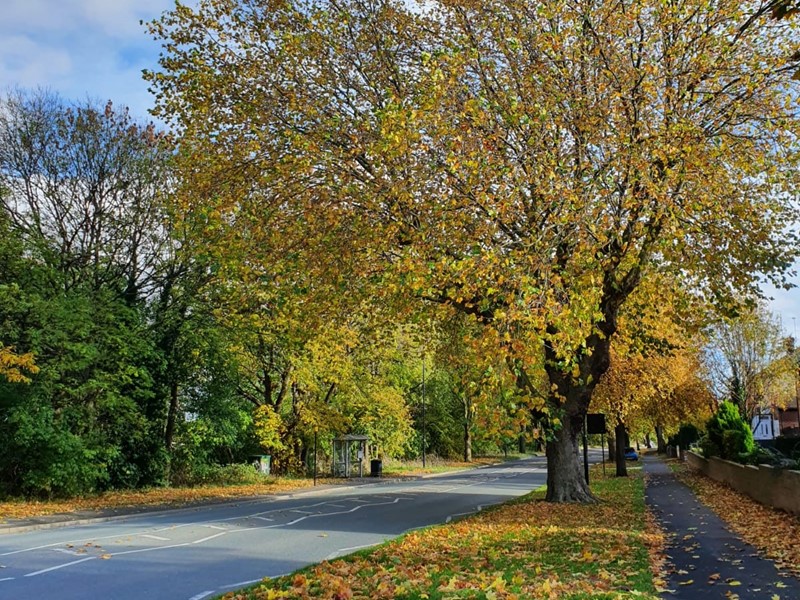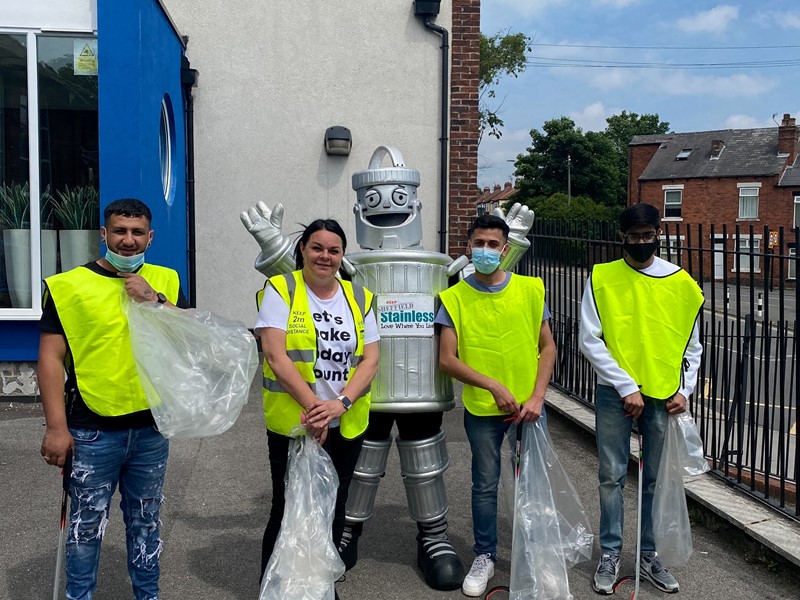Around 4000 school children were part of a litter education session during the last academic year and Streets Ahead are continuing to deliver their assemblies on reducing litter across the city.
Waste not, want not

Maintaining and cleaning Sheffield’s 1,180 miles of roads and pavements makes for a lot of waste.
From old metal street furniture to discarded rubber tyres; thousands of tonnes of rubbish is found and collected across the city each year.
But whilst the accumulated waste is initially deposited at the city’s highways depot in Heeley, it’s reassuring to know that it’s headed in the right direction with the majority being sent off for recycling.
Sheffield’s Olive Grove depot is a busy working site; the control centre for Amey Streets Ahead. Each day, a fleet of vehicles and supplies are despatched to keep Sheffield’s pedestrians and traffic moving freely and safely, whatever the weather throws at them. It’s also a hive of activity when it comes to the world of recycling.
Our depot supervisor Phil tells us just how much of the material handled at the depot is recycled, either because it’s hazardous waste, or because it can be converted by specialists who find alternative uses for it.
“We collect and recycle thousands of tonnes of materials every year. But recycling on an industrial scale like this isn’t something we can do alone. Instead, we work with a number of local companies who help us to play our part in making a difference to the environment.” Said Phil.
Fuel from waste
Among the trickiest of the long-list of waste materials is oil and paint.
The job of collecting it and re-purposing it belongs to Rotherham firm Woodland Oil Ltd.
Woodland Oil Ltd collects waste oils, interceptor waste, used paints, oily rags and anti-freeze.
Simon, their Operations Manager says, “The waste oil is collected by an oil collection tanker and taken to our holding tanks, where it’s tested for chlorine, sulphur, water and metal content. It’s then filtered and blended to make a useable product called PFO (Processed Fuel Oil) - this is a carbon friendly fuel that can be used for ships, or for burning fuel at power stations.
“Oily rags are cleaned and recycled into hand cloths. If they are too contaminated, they are burnt to create energy that in turn will run machinery.
“Paint is separated into different types and the solvents processed in solvent recovery. The solid paint is sent to a recovery plant to create energy that again is used to power machinery.
“Anti-freeze is sent for treatment to remove the glycol content and the water is neutralised and sent to water treatment to be re-used. At Woodland, we always try and find a way to re-use waste products to aid our carbon footprint.”
Litter power
Another key local partner helping us achieve our recycling goals is waste specialist Fletchers Waste Management, of Darnall. With their help, the 6,900 tonnes of litter collected from roadside bins or left on Sheffield’s streets is either recycled as raw materials for new products or used to generate electricity.
“Few people give a second thought to where their litter goes once it leaves their hands,” said street cleansing operations manager, Sara Bradley.
“Fortunately, for people who put it in the bin they can be sure it gets handled responsibly, ensuring its impact on the environment is limited.”
The waste sorted by Fletchers’ is prioritised for recycling as a direct alternative to landfill. Once hazardous and food waste is removed, around a third of it becomes raw materials for new products.
Where recycling is not an option, biomass and energy from waste processes recover enough electricity from what’s left to power the equivalent of more than 380 homes for a year.
Metals, old tyres and gully waste
For larger metals, in keeping with Sheffield’s long and illustrious history of steel-making, empty spray cans as well as other waste metals such as steel, aluminium and copper, are all crushed into cubes and processed.
And what about the 3,500 tyres fly-tipped across the city, every year? Every 6 weeks Streets Ahead sends 350-400 tyres for conversion into granules which can be used as horse bedding or for playground surfaces.
There’s also all the waste products from street sweeping and gully cleaning. It’s mostly water mixed with gravel, sand and organic material such as leaves. It’s collected and washed then sent for further processing.
All in all, there isn’t a day goes by when we aren’t thinking about how we can recycle and re-use the industrial materials we have here at Streets Ahead.
As Phil says, “In the future we would really like to see less litter on the streets of Sheffield and do more processing ourselves, here at the depot.
“It’s a costly exercise that requires a massive amount of resource; particularly when it comes to waste that should never be left on the streets in the first place.
“Right now, we are doing all we can to make sure that we put the environment first, recycling our waste which in turn saves energy and reduces pollution.”
As part of the council’s Clean Sheffield campaign, individuals and businesses alike are being encouraged to take pride in their community and not drop litter.
Whether it’s as simple as picking up a piece of litter on your walk to the local shops, raising awareness of litter prevention or organising a litter pick in your local area, your support helps make Sheffield a cleaner environment for everyone to enjoy.
Cabinet Assistant for Environment and Street Scene at Sheffield City Council, Councillor Karen McGowan said:
“In an ideal world, the amount of litter we produce and dispose of would be next to none. However, we’re taking the right steps to reduce our waste and dispose of it more in a more sustainable way, which can only be positive.
“There’s always more that we could be done and we continue to work with Amey and our other contractors to ensure that we’re taking advantage of all the recycling options that are available to us.
“Taking responsibility for our own litter is the first step- it really is a case of ‘every little helps’. What’s really reassuring is that when we dispose of our litter correctly, it can then begin its journey to be recycled and finally re-used for many different purposes.”
For more information on Clean Sheffield visit: www.sheffield.gov.uk/cleansheffield
Anyone who wants to report a litter problem can call 0114 2734567 or visit https://www.sheffield.gov.uk/home/report



